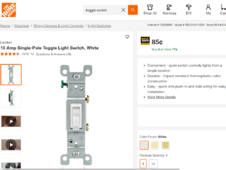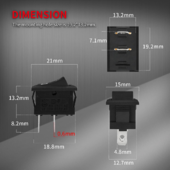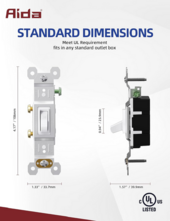You've convinced me. I have ordered a Phoenix converter and will use it for my lights, and critical SMALL loads. Thanks for all your input! DanLet's play with the numbers:
250VA Victron Phoenix publishes 88% efficient, uses less than 3 watts in idle mode (ECO) and be bought for less than $100.
60 watts of AC lighting would need ~ 70 watts from the battery assuming an inverter efficiency of 85%
Assuming lights run 6 hours/day so 18 hrs. of inverter in ECO mode.
10 watts x 6 hours = 60 watt hours “wasted”
plus
18 hrs/day x 3 watts = 54 watt hours “wasted”
~114 watt hours wasted per day. Give or take that’s 25 extra watts of PV (feel feel to double check all that)
You are using an out of date browser. It may not display this or other websites correctly.
You should upgrade or use an alternative browser.
You should upgrade or use an alternative browser.
Looking for 48v dc light switch
- Thread starter dmpiowa
- Start date
OzSolar
Whatever you did, that's what you planned.
Great to hear! You'll much happier in the long run.You've convinced me. I have ordered a Phoenix converter and will use it for my lights, and critical SMALL loads. Thanks for all your input! Dan
Back in the days when solar panels were $4/watt and the biggest ones were Kyocera 120's people tried to get pretty crazy with DC loads, propane fridges, etc. I figured out pretty quickly that it wasn't worth to me at least.
rustythorn
New Member
i had a similar question and my system is a victron inverter, however, i still want to double the check the safety of using a 12VDC switch at 48VDC [really 50-60VDC]. i need to power a 50 watt LED. other than ordering from digikey or mouser, etc... there does not seem be any way to get low amp 48VDC switches. my assumption is that a switch rated for 20A 12VDC/10A 24VDC should be able to handle at least 2.5A @ 48VDC and still be safe for 1A @ 60VDC?
my reasons are a little different, this is vehicle application so i'm very limited on how many solar panels i can have and i would like to have my lights work even if my inverter is not working.
my reasons are a little different, this is vehicle application so i'm very limited on how many solar panels i can have and i would like to have my lights work even if my inverter is not working.
For this 1a load, i think a standard house switch would be okay if it's fused before the switchi had a similar question and my system is a victron inverter, however, i still want to double the check the safety of using a 12VDC switch at 48VDC [really 50-60VDC]. i need to power a 50 watt LED. other than ordering from digikey or mouser, etc... there does not seem be any way to get low amp 48VDC switches. my assumption is that a switch rated for 20A 12VDC/10A 24VDC should be able to handle at least 2.5A @ 48VDC and still be safe for 1A @ 60VDC?
my reasons are a little different, this is vehicle application so i'm very limited on how many solar panels i can have and i would like to have my lights work even if my inverter is not working.
efficientPV
Solar Addict
- Joined
- Sep 24, 2019
- Messages
- 1,355
Try this, put a voltmeter between the 48V power source and the light and measure the voltage. Depending on the constant current circuit in the light you might see less than 20V across the switch. So what if the switch arcs and shorts. Failure mode is only turning on the light.
rustythorn
New Member
a 12v 20A DC switch is tiny, light and cheap, a 120VAC house switch is large, heavy and pricey. however, the real question then is how to find a cheap low amp 48v fuse. only thing i've found are the old school glass fuses, unfortunately, all the fuse holders for glass fuses are only rated up to 32vFor this 1a load, i think a standard house switch would be okay if it's fused before the switch
Um... Larger? Relatively, I guess yeah. Heavy and pricey? How about less than $1 and weighs maybe an ounce?a 12v 20A DC switch is tiny, light and cheap, a 120VAC house switch is large, heavy and pricey. however, the real question then is how to find a cheap low amp 48v fuse. only thing i've found are the old school glass fuses, unfortunately, all the fuse holders for glass fuses are only rated up to 32v

rustythorn
New Member
that is what i'm thinking i just wanted some validation. i'm planning on a dozen or so of these direct from the 48v battery connections so i will put in one main switch at the battery with a high rating to turn off all of them.Try this, put a voltmeter between the 48V power source and the light and measure the voltage. Depending on the constant current circuit in the light you might see less than 20V across the switch. So what if the switch arcs and shorts. Failure mode is only turning on the light.
i'm planning on having four 50 watt white led strips and two 50 watt red led strips on the ceiling, each with their own switch. maybe some outdoor lighting and i'm also going to wire up either two 24v fans or four 12v fans in series with a thermal switch to keep the electronics cool
Specs seem to indicate 600v. Doesn't indicate AC/DC, but the DC32v ones are usually 250vac
OzSolar
Whatever you did, that's what you planned.
Why doesn't someone just hook up a regular light switch to thier 48v battery and count how many times they can switch a light before it fails or until they hear some arcing?
rustythorn
New Member
Um... Larger? Relatively, I guess yeah. Heavy and pricey? How about less than $1 and weighs maybe an ounce?
View attachment 206247

vs

Checkthisout
Solar Wizard
- Joined
- Nov 14, 2021
- Messages
- 4,816
Yeah seriously. I use standard 120V snap switches on all my stuff. I was told this wouldn't work by many and would end up with disasterous arcing and short switch life etc.
All this musing and nobody will just take an 89 Cent switch and test it to see what happens.
All this musing and nobody will just take an 89 Cent switch and test it to see what happens.
rustythorn
New Member
maybe but that one is listed as not available, i did point out in my first post that i could get some 'to-spec' items if i ordered from digikey or mouser, etc..., however, i can get 20 12v 20a switches on amazon for the price of one 48v 2a switch on digikey. which is why i'm asking the question. i could spend $100 at digikey or mouser, etc... or less than $10 at amazon if we think a 12v 20a switch can safely handle 1a @ 48v [50-60v]?Specs seem to indicate 600v. Doesn't indicate AC/DC, but the DC32v ones are usually 250vac
Checkthisout
Solar Wizard
- Joined
- Nov 14, 2021
- Messages
- 4,816
maybe but that one is listed as not available, i did point out in my first post that i could get some 'to-spec' items if i ordered from digikey or mouser, etc..., however, i can get 20 12v 20a switches on amazon for the price of one 48v 2a switch on digikey. which is why i'm asking the question. i could spend $100 at digikey or mouser, etc... or less than $10 at amazon if we think a 12v 20a switch can safely handle 1a @ 48v [50-60v]?
It will be fine but seriously, what is stopping you from buying an 85 Cent switch, hooking it up to a battery and load and seeing what happens?
rustythorn
New Member
nothing, but it should be faster and easier to ask firstIt will be fine but seriously, what is stopping you from buying an 85 Cent switch, hooking it up to a battery and load and seeing what happens?
Checkthisout
Solar Wizard
- Joined
- Nov 14, 2021
- Messages
- 4,816
nothing, but it should be faster and easier to ask first
Fair enough.
Just understand that everyone is going to "poo poo" your idea and say snap switches are not suitable for switching DC circuits but the thing to understand is none of them have experimented with it themselves to see what happens with the voltage and load you're proposing to switch.
You're just not drawing enough current to matter.
rustythorn
New Member
thanks, figured it would work i was just a little taken aback when i started digging into low amp 48 volt switches and fuses and found next to none. even the old school glass fuses rated up to 250v are somewhat useless if are hoping to find a fuse holder that states it is rated above 32v. the new ones only go 32v and the old ones don't say anything.Fair enough.
Just understand that everyone is going to "poo poo" your idea and say snap switches are not suitable for switching DC circuits but the thing to understand is none of them have experimented with it themselves to see what happens with the voltage and load you're proposing to switch.
You're just not drawing enough current to matter.
i would not be surprised in a few years when 48v automotive batteries start becoming more common we will watch all those 32v fuses suddenly get relabeled 48v without any physical changes
rustythorn
New Member
update, i think i found solution. since my plan all along was to string together 12v led strips for a total of 48v, i could wire the switch in the middle so that it will be at 24v. that would allow me to use common off the shelf [aka amazon] switches since many are rated at 24v usually at 5 amp.
Checkthisout
Solar Wizard
- Joined
- Nov 14, 2021
- Messages
- 4,816
update, i think i found solution. since my plan all along was to string together 12v led strips for a total of 48v, i could wire the switch in the middle so that it will be at 24v. that would allow me to use common off the shelf [aka amazon] switches since many are rated at 24v usually at 5 amp.
Totally unnecessary
Similar threads
- Replies
- 5
- Views
- 186
- Replies
- 9
- Views
- 491
- Replies
- 4
- Views
- 164
- Replies
- 41
- Views
- 2K


